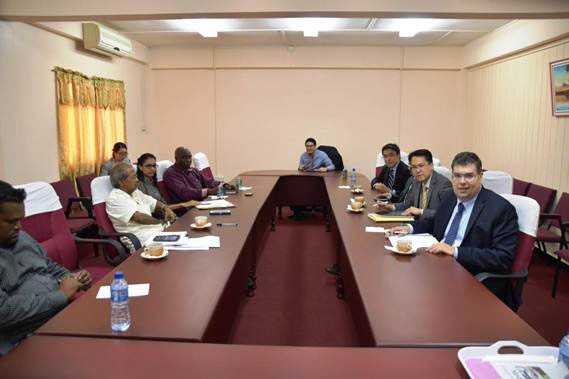The sugar union GAWU on Wednesday told a visiting team from the International Monetary Fund (IMF) that decisions by the APNU+AFC government to miniaturise the sugar industry were made without any studies being done on the impact of this.
In a release on Thursday, the Guyana Agricultural and General Workers Union (GAWU) said it engaged at its Kingston HQ with a team from the IMF which is here for routine Article IV consultations where they assess the country’s economic situation.
GAWU said that the IMF team was keen to hear about its views on developments in the sugar industry where over the last two years four estates have been shut and sugar production has fallen precipitously.
“We did share with them the sad situation that is now playing out in many villages as thousands of workers have been put on the breadline following the closure of four… sugar estates during the last two …years. Our Union lamented that the decisions to minimize the sugar industry were taken without any study to really assess the ramifications. The GAWU contended that had such an examination been properly, and more so sincerely, pursued it certainly could have very well avoided the harshness of the situation today”, the union said.
GAWU said that the IMF team also wanted to know how the thousands of workers made redundant were coping at this time.
“We did advise that many are unable to get steady jobs and even in those instances where they have found jobs, the conditions are, in many instances, far inferior from what they enjoyed as a sugar worker. This, we shared, has had a telling impact on family life with some workers having to contend with the reality of a broken family, noticeable growth of domestic violence, or to discontinue their children’s education, etc. The issue of severance was raised and we shared that the payments the workers received could not sustain them for any considerable period. On this matter, we expressed our deep dismay that despite the law, the Government paid some workers half of their entitlements with a commitment to pay the remainder in the second-half of 2018”, the union related in the press release.
The union said that it told the IMF team that the Government had changed gear somewhat since it has opted to divest the Rose Hall and East Demerara Estates as opposed to closing them outright. This intention, GAWU said, at least offered some laid-off workers a chance to regain employment.
“We expressed our deep concern with the dramatic fall in sugar production which moved from some 231,000 tonnes in 2015 to just over 137,000 tonnes in 2017. We shared that the usual finger of blame – work stoppages – could not have been used by GuySuCo as an excuse recognizing that official statistics painted a different picture”, GAWU stated in the press release.
The union said it also expressed dismay to the IMF team on the conflicting statements of the Minister of Agriculture, Noel Holder in relation to his responsibility for the sugar industry.
“We said this is a matter that required urgent attention and rectification as it does not serve to inspire confidence. The GAWU also welcomed the recent $30B financing for the industry but, at the same time, expressed our deep concern regarding the absence of a clear plan. We did share that in principle we supported the initiatives but could only be convinced after seeing the plan that would be put forward”, GAWU said.
The union also stated that it used the opportunity to share its concerns about the economy and pointed to the 2.1 per cent growth recorded in 2017 as against the IMF’s expected growth rate of 3.5 per cent.
The union said it also expressed disquiet over the decline in gold and foreign exchange reserves which have been on a downward trend. “In terms of gold reserves, the IMF said that the reserves have been converted to investments by the Central Bank, which they felt was a prudent move. Regarding the foreign exchange reserves, the IMF team said that shortfall in export earnings together with higher imports accounted for the decline in the foreign exchange reserves. Nevertheless the currently held reserves are sufficient to cover 3.2 months of imports. The team advised that the international benchmark is to have reserves to cover 3 months of imports. This is not necessarily comforting news taking account that the prices of fuel, which represents a sizeable portion of imports, is on the rise. Even if the reserves remain unchanged, should oil prices continue on its current trend then the available 3.2 months of import cover could very well fall below the international benchmark”, the union said. The union said it also spoke about the increasing borrowing by the Government in recent times and disclosed that the IMF said that over the next two years, Guyana’s GDP to Debt ratio would exceed the benchmark of 60 per cent but that with oil inflows from 2020, the ratio would decline to acceptable standards.






